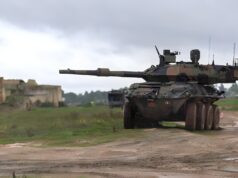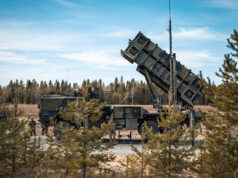Minister Mark Lancaster highlighted how the British and Italian Armed Forces can work closer together at a Protection of Cultural Heritage event,say the MoD.
The Minister also discussed future co-operation with Italian Defence partners.
Minister for the Armed Forces Mark Lancaster said:
“European security is UK security and we are strengthening our defence partnership with Italy, a key NATO ally.
Our two countries cooperate on a wide range of shared security challenges, from threats to valuable cultural property to countering cyber-attacks.”
At the Protection of Cultural Heritage event, Lancaster announced that the Army-led Cultural Property Protection Unit (CPPU) is now starting to recruit reservists. The CPPU was established as part of the UK Government’s implementation of the Hague Convention that places obligations on the Armed Forces for the protection of cultural property from damage, destruction and looting.
In speaking with Italian counterparts, he reaffirmed the UK’s commitment to the Statement of Intent signed earlier this year to ‘further defence and security cooperation between the two countries in the maritime, land, air and cyber domains and to strengthen the interoperability of the Armed Forces through regular planning and training activities’.












CPPU…?
Never heard of it. Is this the DCSU lot at Hendon, and MoD have indulged in their favourite game changing names for the sake of it again?
The Monuments Men Redux lol !.
So we are going to deploy Apache gunships to defend the British museum or Stonehenge?
Bizarre notion.
European security should not be UK security if the EU maintain their deliberate attempts to block an amicable BREXIT with the Irish border issues.
Perhaps the idea is that we would rather have the Europeans feel the initial blast before it touched us, therefore helping European security is UK security.
Should the Russians take the Baltics, which they could, all the glaring deficiencies in equipment and manning would be on view to the world because NATO could not retake the Baltics and hence its reason for being would come into question. Bereft of European support, we would be sunk.
NATO inclues the US, and so yes it could easily retake the balkans. Whether it would risk nuclear way by doing so, is another question.
Baltic States I mean and nuclear was not way.
“War” ?
They need poachers turned gamekeepers.
Whereas you just need a functioning brain Ciaran, I hear you are stil lying about l have been attached to The Intelligence Corps as opposed to thrown out the Territorial Army Royal Army Medical Corps Private Goggins?
You sussed me out you cunning old badger, still Intelligence Corps sounds better than Royal Army Medical Corps Private doesn’t it?
War ?
I come from a long line of reluctant Wel/Irish deserters who only joined the British Army for their first pair of real boots.
Mr Bell, the EU is not NATO, they are quite separate organisations.
Nobody is ‘blocking Brexit’ on the Northern Ireland issue. The Good Friday agreement which ended the Troubles is an international agreement, signed at the UN, between the UK and Ireland. It effectively stipulates no hard border between the North and the Republic, that was part of the price for reaching a peace deal. Both the EU and UK are rightly seeking to honour the agreement.
But if we do a hard Brexit and exit without agreement, or fail to reach a free-trade agreement by 2020, then there will have to be a hard border, because the UK will be a non-member. We will be in the same position as other EU neighbours like Russia or Turkey or Libya – passports will be required, goods will be checked by Customs, import tariffs will have to be paid and so on.
To honour the GFA and avoid a hard border in Ireland, the EU has offered to let the North remain in the customs union and the hard border would have to be at UK ports and airports, as will anyway be the case at Dover and Harwich and Heathrow etc. If we don’t like it or won’t agree to it, we get the hard border in Ireland, break the peace agreement and live with the consequences.
The EU has been consistent and, in my view, correct, in pointing out from day one the obvious choice before us. It is typical, but rather jaundiced, to blame the EU because we have got ourselves in another ill-thought-through jam!
I’ve tried over and over to make the same points to Mr Bell and Chris without much joy. We’re talking past one another with different facts and foundational beliefs. Mr Bell is never going to believe withdrawing defence and security cooperation is suicidally bad for Britain’s interests or that a European alliance is the key to a peaceful continent. Chris is never going to believe that being an EU member is in our national interest or that any form of withdrawal undermines that interest.
Peace in northern Ireland, the integrity of the UK, the car and aviation manufacturing industries, the ability to live/travel/study/work anywhere in Europe, working as a block versus Russia or China or America, joint regulation of research / medicine /atomic/aviation, access to the richest trading block and 60 other countries. Both hark back to an era when our influence, security and prosperity were based on what are now long gone realities. It’s a dangerous world and we’re about to make it significantly harder than it need be.
52% of eligible voters that bothered to vote want to leave, fck the consequence. Well now we shall all have to live those consequences, while blaming anyone else but ourselves. Worst of all we’re tearing each other apart and all our governing bandwidth is overwhelmed with brexit. How did we end up the basket case of Europe?
None of the activities you’ve note above requires a supranational political entity with powers of coercions to supervise or direct this.
Most people who voted for Brexit were not rejecting cooperation with our European partners but the political body and its aspirations located in Brussels.
It is not right to damn leavers for wanting to reaffirm all Briton’s sovereignties and right to self determination because you like the idea of working in France. And nor does your fancy for working in the EU trump others’ desires for a more robust immigration regime.
We live in a democracy which has systematically ignored the majority of the populace for 30 years on these matters. When the referendum happened the majority spoke. Now Remainers are upset they’re no longer calling the shots. BUT this whole mess could have been avoided had the concerns of the majority been listened to and acted on decades ago.
The pro-EU establishment, which refused to countenance a different destiny for Britain stored up decades of grievances which were released in 2016. This is what happens when you oppress the people’s will for decades, eventually they find away to assert themselves.
‘European security is our security’ As evidence above there are many of us who would disagree sir.
David, because whenever things go south on the continent, Britain has to spend money and blood helping to sort it out so that we don’t end up being next in line.
Prevention is better than cure.
Not to mention liberal democracy needs all the friends it can get. This worldwide dalliance with democracy is historically rather novel. It’s astonishing how much we take for granted.
David, because whenever things go south on the continent, Britain has to spend money and blood helping to sort it out so that we don’t end up being next in line.
Prevention is better than cure.
Not to mention liberal democracy needs all the friends it can get. This worldwide dalliance with democracy is historically rather novel. It’s astonishing how much we take for granted.
My paternal Uncle Geovani Goggins helped drive the Germans in Italy into the sea when his taxi carrying four german Waffen SS was driven off the harbour into the sea. He was very drunk at the time I should add.
Anthony
The Northern Ireland issue should be simple. The Uk and EU agree to a limited duration customs union whilst allowing the UK in the transition period to come to a free trade deal with the EU. The EU however wants either a return to the hard border so they can blame the UK, or to fracture the UK apart and enforce an Irish settlement whereby the 2 Ireland’s unify. Against the wishes of the people of Northern Ireland.
We were always only ever going to get a no deal scenario from the EU unless we allow the EU to push us around and treat us all like fools. It is simply a matter of the EU not allowing any nation to dare leave what in fact none of us ever voted for.
Can you name any single person in the UK that voted for the EU parliament, the Euro, the EU courts, the EU Armed forces, the ECB or any of the other malodorous systems of a non democratic superstate. Wake up people. In the future the EU will be seen for what it actually is. A means for Germany and to a lesser extent their lap dogs the French to control Europe. Control through economic and diplomatic means, having failed twice to control Europe militarily.
I welcome March 2019. At least we will be free as a sovereign country once again. There will be a cost but we will have to shoulder it. As Churchill said we should look to the sea and not the European mainland for our prosperity and future successes.
Hi Mr bell. Thanks for not shouting me down. We’re all very passionate about this one. All id say is that…
We’re not in the euro, which shows we can veto the bits our elected government doesn’t like. Which is anything too federal for us to stomach. Europe will always be at least two if not three tiers of integration. There is no euro army and the best way of making sure it never happens is being inside and vetoing it.
While bearing in mind the commission is appointed by the elected goverments and elected European parliament. All further integration is agreed unanimously by elected goverments via treaty. There’s a democratic balance. Blame our government for agreeing Maastricht and Lisbon. The European council is the real power. The court, will it had British judges and makes sure Britain isn’t disadvantaged by other members too.
It was always a political project right from the first treaty. Thatcher tricked the some people into thinking it was about economics. It wasn’t. Pooling sovereignty has its downsides (and mission creep into the truly domestic) but also it’s upsides. We might look to the sea economically but what we’ll find is a world that has moved on politically, leaving us squeezed or ignored by the much larger, more powerful blocks/states. Economic might equals political might in all its forms.
On Ireland, free trade I think means no tarrifs, not mutual recognition of standards, so border checks required.
What kind of democracy is it when the entire establishment is pro-European?
How does one vote down Maastricht when the political class is in favour of further integration – where is the choice? We should have had a referendum then, which we’d have rejected but then be forced to vote again on a “People’s Vote” to overturn the idiots who voted against it in the first place. What kind of democracy is this?
Regarding the ROI we could unilaterally declare all Irish products tariff free and re-affirm freedom of movement for all Irish nationals in the UK.
Then we establish customs checks on the ROI’s borders with the world, a third lane for good entering the ROI destined for the UK. That would give us the solution we want but do you think the EU would accept it? If not, why should we accept NI being left out in the cold to meet our Good Friday obligations?
In reality my proposed solution would include a third lane for all ports to the island of Ireland, for goods destined for the UK in the South and those destined for the EU in the North. A compromise that would work I believe but one that would require the EU to stop behaving like Trump.
I’m curious with all this Ireland border business how Switzerland trades quite happily with the EU and no hard border.
Switzerland is a member of the European free trade association. Switzerland duplicates EU law rather applies it directly, which allows it to satisfy EU requirements for access to its markets. Oh and it pays into the EU budget and accepts free movement of people.
We were one of the founding members of EFTA and we could revert back. The other three members have a more direct relationship with European law but are covered by the EFTA court rather than ecj.
It would solve the Irish border and frictionless trade issue and ecj issue. It’s freedom of movement for workers rather than people, with a budget contribution, a say in regulation but having to abide by it, which limits scope to some extent to sign trade deals with countries not covered by EU or its 60 trade deal partners.
Not a bad compromise for a country split 48/52.